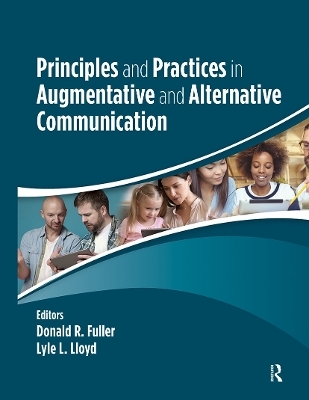
Principles and Practices in Augmentative and Alternative Communication
SLACK Incorporated (Verlag)
978-1-63091-584-1 (ISBN)
A definitive textbook for students in speech-language pathology, audiology, and communication sciences and disorders, Principles and Practices in Augmentative and Alternative Communication offers students an introduction to augmentative and alternative communication (AAC) and prepares them for working with clients with complex communication needs.
Editors Drs. Donald R. Fuller and Lyle L. Lloyd and their contributors provide a foundation for the development of assessment and intervention procedures and practices within the framework of the communication model and its major components: the means to represent, the means to select, and the means to transmit.
Principles and Practices in Augmentative and Alternative Communication consists of five major units:
An introduction to AAC, from its history to current practice
An overview of AAC symbols and a comprehensive discussion of aided and unaided symbols
A review of AAC technology
The components of AAC assessment: principles, vocabulary, symbol selection, and the prescription of AAC technology
AAC intervention: everything from the components of the intervention process to examples from specific cases and settings
Included with the text are online supplemental materials for faculty use in the classroom.
Students and professionals looking for a foundational textbook in the field of AAC will find Principles and Practices in Augmentative and Alternative Communication to be effective, contemporary, and practical.
Dr. Donald R. Fuller is professor and chair of the Department of Communication Sciences and Disorders at The University of Texas Rio Grande Valley. He earned his Bachelor of Science in Education and Master of Speech Pathology degrees from Arkansas State University and his doctoral degree at Purdue University, where Dr. Lloyd was his major professor and mentor. During his career in higher education, Dr. Fuller assisted in creating a master’s degree program in speech-language pathology at Florida International University and was founding chair of the Department of Speech- Language Pathology at Misericordia University. Although Dr. Fuller’s passion lies in administration in higher education, he has maintained his interest in augmentative and alternative communication (AAC), publishing several articles and making numerous presentations, primarily involving the iconicity and complexity of aided symbols and theoretical issues in the discipline. He coauthored the 1997 textbook, Augmentative and Alternative Communication: A Handbook of Principles and Practices with Dr. Lloyd and Helen Arvidson. Dr. Fuller was elected a fellow of the American Speech-Language-Hearing Association in 1998. Dr. Lyle L. Lloyd is considered by some to be a father of AAC. His accomplishments in this discipline are detailed in the In Memoriam section of this book. Upon reading the memorial, one will gain considerable understanding of why he is held in such high esteem by the AAC community. Dr. Lloyd earned his Bachelor of Science degree from Eastern Illinois University, his Master of Arts degree from the University of Illinois, and his doctoral degree from the University of Iowa. Dually certified as an audiologist and speech-language pathologist, he served the early part of his career as a clinician and researcher, especially in the area of intellectual disability. His proclivity for research and successful grant writing opened the door to employment at the Parsons State Hospital and Training Center in Kansas and the National Institute of Child Health and Human Development. He held faculty positions at Western Michigan University, Gallaudet College, and Purdue University. During his tenure at Purdue University, Dr. Lloyd mentored nearly 40 doctoral students; many of these former students are now leaders in the field of AAC. Due to his contributions to AAC, special education, and speech-language pathology, Dr. Lloyd earned honors of the American Association on Intellectual and Developmental Disabilities, American Speech-Language-Hearing Association, Council for Exceptional Children, and the International Society for Augmentative and Alternative Communication. Dr. Lloyd passed away February 12, 2020, at age 85 years.
Preface In Memoriam: Lyle L. Lloyd, PhD, CCC-A/SLP, FAAIDD, FASHA, FISAAC Part I: Introduction to AAC Chapter 1: Introduction and Overview Chapter 2: History and Evolution of AAC Chapter 3: AAC Models and Classification Systems Chapter 4: Professional Issues in AAC Chapter 5: Cultural and Linguistic Diversity and AAC Part II: AAC Symbols Chapter 6: Introduction to AAC Symbols Chapter 7: Aided AAC Symbols and Their Characteristics Chapter 8: Unaided AAC Components Part III: AAC Technology Chapter 9: Background, Features, and Principles of AAC Technology Chapter 10: Applied Technology Part IV: AAC Assessment Chapter 11: AAC Assessment Process Chapter 12: Vocabulary Selection Chapter 13: The Process of Symbol Selection Chapter 14: Technology Selection Part V: AAC Intervention Chapter 15: Intervention Principles 16: Seating, Positioning, and Communication Chapter 17: Speech-Generating Device Funding Chapter 18: Intervention for Persons With Developmental Disorders Chapter 19: Using AAC to Promote Literacy Chapter 20: Communication-Based Approaches to Challenging Behavior Chapter 21: AAC Intervention for Persons With Acquired Disorders Chapter 22: AAC in Acute Care Settings Chapter 23: AAC for Persons With Sensory Impairments Glossary References Index
| Erscheinungsdatum | 10.08.2020 |
|---|---|
| Verlagsort | Thorofare |
| Sprache | englisch |
| Maße | 216 x 279 mm |
| Gewicht | 1380 g |
| Themenwelt | Medizin / Pharmazie ► Allgemeines / Lexika |
| Medizin / Pharmazie ► Gesundheitsfachberufe ► Logopädie | |
| Medizin / Pharmazie ► Medizinische Fachgebiete ► HNO-Heilkunde | |
| Medizin / Pharmazie ► Physiotherapie / Ergotherapie ► Ergotherapie | |
| ISBN-10 | 1-63091-584-X / 163091584X |
| ISBN-13 | 978-1-63091-584-1 / 9781630915841 |
| Zustand | Neuware |
| Informationen gemäß Produktsicherheitsverordnung (GPSR) | |
| Haben Sie eine Frage zum Produkt? |
aus dem Bereich


